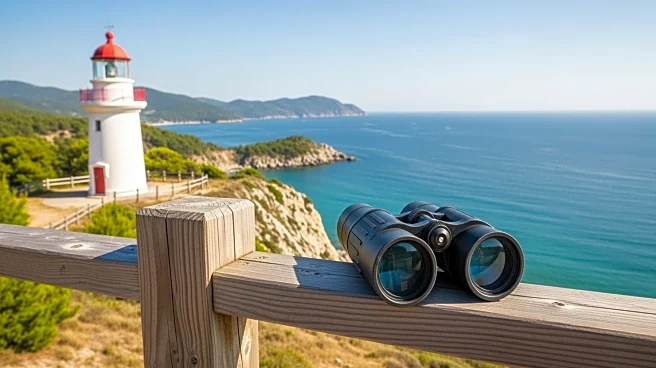What's Happening?
The Swedish Coast Guard has reported an incident involving a crewmember of a Liberian-flagged bulk carrier who was caught dumping household trash into the Baltic Sea. The offense was detected by a Coast Guard aircraft
during routine patrols. The ship, which was on a journey from Russia to India, had paused near Faro Island before heading towards Gothenburg. Upon anchoring off Gothenburg, the Coast Guard boarded the vessel and conducted interviews, leading to the crewmember's confession. The individual was fined '50 daily fines,' a penalty determined by Swedish law based on personal income. This incident underscores the Coast Guard's increased surveillance efforts in response to concerns about shadow fleet vessels in the region.
Why It's Important?
This incident highlights the ongoing environmental challenges faced by maritime authorities in preventing pollution in international waters. The Swedish Coast Guard's proactive monitoring and enforcement actions serve as a deterrent against illegal dumping, which can have significant ecological impacts. By holding individuals accountable, rather than the vessel or its master, Swedish law emphasizes personal responsibility in environmental protection. The increased surveillance efforts reflect a broader commitment to safeguarding marine environments, which is crucial for maintaining biodiversity and preventing long-term ecological damage.
What's Next?
The Swedish Coast Guard is expected to continue its enhanced monitoring efforts, including regular surveillance flights and collecting insurance information from ships passing through Swedish waters. These measures aim to deter illegal activities and ensure compliance with environmental regulations. The incident may prompt other maritime authorities to adopt similar strategies to combat pollution and protect marine ecosystems. Additionally, the case could lead to discussions on strengthening international maritime laws to address environmental offenses more effectively.
Beyond the Headlines
The incident raises questions about the effectiveness of current maritime regulations and the need for international cooperation in enforcing environmental standards. It also highlights the ethical responsibility of individuals working in the maritime industry to adhere to environmental laws. The increased surveillance by the Swedish Coast Guard may set a precedent for other countries to follow, potentially leading to a global shift towards more stringent monitoring and enforcement practices.









